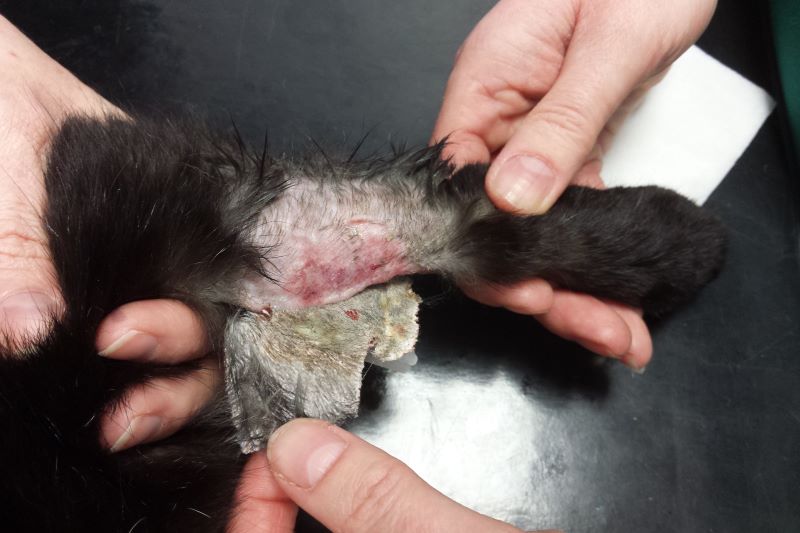New RVC study identifies risk factors associated with Peripheral Intravenous Catheters complications
New research led by a team at the Royal Veterinary College (RVC) has identified multiple factors that can contribute to the occurrence of complications following the placement of Peripheral Intravenous Catheters (PIVCs). The risk factors identified included the number of insertion attempts, whether a second subsequent placement was required, the frequency that the catheter was flushed and if the flush solution was compound sodium lactate.

The proportion of hospitalised cats and dogs that have PIVCs inserted in veterinary practice is unknown, but it is highly common for hospitalised cats and dogs to have a PIVC placed. PIVCs are used to support patient care including administering fluids, antibiotics and anaesthetics and drawing blood.
However, in some cases, PIVC complications can occur. These range from local infections and skin conditions to the emergence of additional conditions which can substantially impact patient welfare, contribute to additional treatment costs and delay the time of discharge.
Therefore, the study, led by Eleanor Haskey, an Anaesthesia and Analgesia Nurse at the RVC’s Queen Mother Hospital for Animals, sought to address the lack of evidence related to best practice of PIVC management.
The nurse-led multicentre observational study described 382 placements of catheters across 19 different institutions, recording the placement techniques and tracking resulting complications to determine the associated risk factors. The vast majority of the data were collected by veterinary nurses across the country, and by working together managed to collate information from a large number of PIVCs.
In addition to identifying the risk factors, the study also found that complications occurred in just over one-quarter of placements, with limb swelling and phlebitis, an inflammation that causes blood clots, being the most common (11.5%). The second most common complication observed was PIVC dislodgement/patient interference (7.9%).
From these findings, the researchers call for more vigilant monitoring of patients with a PIVC in situ, particularly if they have experienced any of the factors that increase their risk of complications. The study will importantly support further research into best practice for PIVC placement which reduce complications and support the welfare of small animals receiving treatment.
Eleanor Haskey, Anaesthesia and Analgesia Nurse in the Royal Veterinary College’s Queen Mother Hospital for Animals and lead author in the study, said:
“PIVCs are placed every day in almost all veterinary practices, yet there is little evidence to inform how best to place and manage them. I am passionate about providing the best care for cats and dogs, and it was fantastic to work with like-minded nurses and vets who wanted to gather the evidence that we can use to improve the care of our patients. I look forward to continuing this area of research, and believe veterinary nurses are best placed to undertake this work as it is part our of daily working lives.”
Dr Christopher Scudder, Senior Lecturer in Small Animal Internal Medicine at the Royal Veterinary College and senior author in the study, said:
“As veterinary nurses place and manage most intravenous catheters, Eleanor and her team were excellently placed to expertly lead this study which can be used to develop future guidelines to support best practice. The hope is that this study will stimulate more research about PIVCs, and that sufficient evidence will be developed to help reduce complications associated with these routinely placed devices.”
Notes to Editors
Haskey, E., Maund, V. et Al., ‘Placement, management and complications associated with peripheral intravenous catheter use in UK small animal practice’, Journal of Small Animal Practice, https://doi.org/10.1111/jsap.13782
Reference
For media enquiries, please contact:
- Jasmin De Vivo at jasmin.devivo@plmr.co.uk or mailto:rvc@plmr.co.uk
- Press Line: 0800 368 9520
About the RVC
- The Royal Veterinary College (RVC) is the UK's largest and longest established independent veterinary school and is a Member Institution of the University of London.
- It is one of the few veterinary schools in the world that hold accreditations from the RCVS in the UK (with reciprocal recognition from the AVBC for Australasia, the VCI for Ireland and the SAVC for South Africa), the EAEVE in the EU, and the AVMA in the USA and Canada.
- The RVC is ranked as the top veterinary school in the world in the QS World University Rankings by subject, 2024.
- The RVC offers undergraduate and postgraduate programmes in veterinary medicine, veterinary nursing and biological sciences.
- The RVC is a research-led institution, with 88% of its research rated as internationally excellent or world class in the Research Excellence Framework 2021.
- The RVC provides animal owners and the veterinary profession with access to expert veterinary care and advice through its teaching hospitals and first opinion practices in London and Hertfordshire.
You may also be interested in:
-
RVC Students Among Top Three in BSAVA Research Project Competition
Two RVC students were placed in the top three in the BSAVA’s Companion Student Research Project …

